- Home
- Dennis Cooper
I Wished
I Wished Read online
Also by dennis cooper
The George Miles CycleCloser
Frisk
Try
Guide
Period
Other Fiction
Wrong
My Loose Thread
The Sluts
God Jr.
Ugly Man
The Marbled Swarm
Copyright © 2021 by Dennis Cooper
All rights reserved.
This book is a work of fiction. References to real people, events, establishments,
organizations, or locales are intended only to provide a sense of authenticity and are used ficticiously. All other characters, and all incidents and dialogue are drawn from the
author’s imagination and are not to be construed as real.
Published by
Soho Press, Inc.
227 W 17th Street
New York, NY 10011
Library of Congress Cataloging-in-Publication Data
Names: Cooper, Dennis, 1953- author.
Title: I wished / Dennis Cooper.
Description: New York, NY : Soho, [2021]
Identifiers: LCCN 2021011525
ISBN 978-1-64129-304-4
eISBN 978-1-64129-305-1
Classification: LCC PS3553.O582 I24 2021 | DDC 813/.54—dc23
LC record available at https://lccn.loc.gov/2021011525
Interior design by Janine Agro, Soho Press, Inc.
Printed in the United States of America
10 9 8 7 6 5 4 3 2 1
for Zac Farley
Overture (2021)
I started writing books about and for my friend George Miles because whenever I would speak about him honestly like I am doing now I felt a complicated agony beneath my words that talking openly can’t handle.
There’s no one I can talk to, basically. Every friend I used to have who also knew him hasn’t sought me out in years, which would be easy since I’m very mildly famous, whereas their last names are so commonplace that, when I search the web for them, literally thousands of candidates show up.
I’ve talked about my friend in so many articles and interviews. If you do a search using his name, pages and pages will turn up, and every one that’s not about some far-flung namesake is either by me or about me, or it’s something made by someone who only knows the characters I’ve named for him.
How could someone like him die without a single friend or member of his family ever putting up a tribute page or even mentioning his name in tweets or Facebook posts, even on his birthday or on his death day’s anniversary or even randomly in reference to something in their lives or art that brought his memory to mind.
Why hasn’t anyone who knew him ever tried to contact me to say, “I knew him too,” or “Thank you for devoting so much writing to him,” or “How could you have written such disturbing things about my friend or brother or former boyfriend or son or cousin?” Is what I’ve done that obscure? I guess.
When George doesn’t cross my mind, which can happen for a while, weeks, months, I’m okay, but then I think of him and get like this. But not “like this” because I almost never talk about him, period. I’ll say a little, and people will say, “That’s interesting and sad.” But they mean for me and not for him.
Or I write about him, and my readers say, “That’s sick or awesome, or he’s so cute, or he’s too unsympathetic, or he’s very touching, or he’s boring, or he’s really sexy, or I knew someone like him too, or I relate to him so much,” which is the best or only meaningful response that I can even hope for. That’s as good as it will ever get for him.
I saw a therapist for three years, and I talked about him there, but she said he was a symbol in my lifelong playing out of shit my parents did to me, and she just wanted me to talk about my past, not him. I would ask her please, please forget about me and think of me as just some person who is telling you about him.
I know how difficult he was to be around, and how emotionally hot and cold, and I understand he did and said some awful things to people near the end when I wasn’t with him unforgivably, but could his death really have been such a big relief to everyone? Like, I never need to think about that guy again?
I had a friend who claims to be a psychic. She did a reading for me once and said she saw him hovering above my head or something. She said he’s always watching over me, feeling so much love and gratitude for something that I used to do for him or have been doing since he died, and I almost believed her, and maybe I even do. That’s how easy it is to hurt me.
Even now I think, What if her envisioning was true, because I want so unbelievably and inexpressibly for him to know he meant and means so much to me that I have written and still keep writing all these elegies and things, even when I’m not communicating anything beyond my need to talk about him, but why?
I guess because I want someone who knew my friend to read this book and find me. I want this book to be more public than my others so it will find people who don’t normally read novels or who don’t give a shit about some weird cult writer’s books because it seems like everyone who either knew him or used to know me doesn’t.
I want to know that all my love for him is worth it or find someone who’ll convince me he was no one much, or who’ll say, “He never mentioned you,” or that he referenced me offhandedly enough that it’s clear I didn’t mean that much to him, and that’s the hope, and that’s the fear, and I know that’s only semi-interesting to read, but it’s very hard for me to even do this.
Torn from Something
George’s father is a failed Olympic gymnast who seems overly standoffish and dejected even for a Russian. He still looks teenaged in his early 30s except when he takes off his shirt, because there’s something too dog-eared about his muscles. George thinks he’d look exactly like his father if his father were a worm. He’s a 12-year-old nobody much who wishes he could play guitar and is watching an American cartoon.
Every country dubs its language over foreigners’ TV shows, but in Russia it’s a racket. One sermonizing voice reads the actors’ dialogue as though the show were an appliance and their gab were its instructions while the real, sweet noises rollick faintly in the background. That’s how the rest of the world sounds to Russians if they pay any attention at all.
Donald Duck and his preposterous cohorts are like dolphins signaling their happiness to Russians through a bleak, indifferent surface. It’s a form of mind control that dates back to when the Communists ran everything and makes children of an introspective bent think they can hear the truth attacking through their fruity little thoughts.
George is chuckling at the TV’s muffled playthings and hoping his mother will stand up. His father was scrubbing their bedroom furniture and walls with her fighting, flopping body for a long time. That sounded too familiar, but not the silence afterward that will not stop. George’s mind is saying, If your mother’s dead, you’d better kill yourself.
George’s father barges in the living room and sits bizarrely near his son, which he’d never thought to try before. He seems dazed by the unprecedented access, and his hands throb from having finally killed his wife. He knows he’ll have to kill George now, but first he tries watching the cartoons’ rat-a-tatting nonsense.
George isn’t old enough to be a loss. He’ll just turn one dead body into two, which isn’t very different. People in their building have heard him beat his wife and son so many times they must be numbed. Maybe he could rape George if he finally wants to. Would those screams sound inconsistent? The only danger is he might kill himself for doing that. Is that a problem?
When George’s father was an 8-y
ear-old, investigators from the agency of sports made a routine visit to his school. After watching him cartwheel and twirl above the playground’s swings and jungle gym, they bought him from his parents. He was positioned in a prison-like academy for potential medal winners along with close to 40 other boys with magic bodies.
He was trained to win gold medals in gymnastics with short daily morning breaks to add a barren education. Sometimes he contested in minor showcase competitions in far-flung Russian provinces. He never won anything, but the crowds were full of pedophiles and girls who liked the prettiest contestant, and that was him.
So many film crews shot George’s father’s grimacing, angelic face that it became the public’s mental image of Russia’s gymnastics might for years. That usefulness kept him in the running long after better gymnasts had been axed. Nowadays, when people see George’s father on the street, they often ask if he looked younger and important once.
George’s father unties his shoes and shakes them loose. He whips his T-shirt off. He unzips his pants, or starts to. He rises to his feet so he can slide them down, but he’s infirm from having killed his wife and so much less attracted to the chance of winning something that he slumps back on the couch instead and rubs his sore hands together.
He starts to push George’s head into his crotch, but the head feels like a lightly garnished skull. It makes him stop and think about the brain inside and then his son’s dumb thoughts, whatever they might be. He pets the head while envisaging the thoughts he’d like to work with and then, having made George game, lifts his hand off like a starting gate.
George looks up weirdly at his father, then removes his T-shirt too. He holds the T-shirt tensely in his hand. George’s father rips it from his son’s hand and holds it stiffly in his own. He gives it half a chance to be a shirt, then thinks the Russian equivalent of “fuck it” and wads the cloth until it’s flower-shaped, then sniffs the image.
His erection’s coarse, straightforward wish gets dubbed atop whatever happiness his son and he had made together. He sort of wants to give the flower to George, but love seems stupid, so he drops the shirt, then makes a fist instead. George takes a giant breath, then arcs his back to make the strongest chest his rib cage can create.
“Why did you take off your shirt?” George’s father asks.
“Because you did,” George says.
“Aren’t you scared?” George’s father asks.
George nervously unlocks the tongue and buckle of his belt, which has a cowboy style. “Yes,” he says.
George’s father puts one hand inside the flash of underwear and grabs.
“It says yes too,” he says.
“It probably thinks your hand is mine,” George says.
“Do you jack off?” George’s father asks.
“Sometimes,” George says.
“What do you think about when you jack off?” George’s father asks.
“What’s the right answer?” George asks. He looks into his father’s eyes, which either don’t mean shit or are outdistanced by his mind’s scared shit, then thinks about the question. “Sometimes my mother.”
“Your mother doing what?” George’s father asks and starts jacking off his son, who winces.
“Not this,” George says. “You should lick your fingers first.”
One of George’s bandmates is a fried, revered guitarist who still picks out flabbergasting notes, but they’re strange now. George thinks he’d play guitar remotely like his bandmate if his bandmate were a drunk. He’s a skinny 16-year-old prodigy from Brixton drinking gin and watching dead guitarists play the blues with old acoustic instruments on some TV thing.
Every older era’s sense of scale and vintage tech turn off the young, but to radicals like George, it’s especially deterring. Between the dead guitarists’ minor outreach and the distanced, scratchy footage, they might as well be fiddling with loaded rifles that’ll only hurt themselves. That’s how other people’s sadness sounds to George when he cares at all.
The blues’ originators could be dolphins signaling their primitive unhappiness to more experimental artists. The fact that even innovative art grows cordial over time is a catastrophe that makes groundbreaking young musicians with drinking problems for good reasons know they can’t be gods with giant amps despite the bliss that animates them when they’re trying hard.
George is playing his unplugged Strat with the TV’s ghosts and hoping his bandmate hasn’t quit their band despite the recent hellishness of being with him. He and other members had been yelling one another in the background for a long time. That sounded usual of late, but not the silence ever since that will not stop. George’s mind is saying, “If my bandmate quit, I’m dead.”
George’s bandmate joins him on the couch and sits unnaturally close. He’s never longed to be right next to George until right now, and it’s disorienting to be pressed against someone he only hugs onstage in acts of showmanship, and his dilated eyes are wet from having quit their band. He knows he needs to say goodbye, but first he tries watching the TV.
George isn’t bold enough to be the leader of the band or play the notes alone without lessening their vistas. If the band breaks up, there’ll just be two casualties instead of one. Their fans aren’t smart enough to understand their genius anyway, so would George’s lack of daring even sound that different? Still, George would know. Is that a problem?
George’s bandmate used to play guitar in shitty local bands as though they mattered. The leader of a critically anointed band that played electric blues observed him bend strings incongruously and fit him in their higher ranks. George’s bandmate gigged and played on albums with this band until their orthodoxy started to feel dumbass and claustrophobic.
He started his own band that used the blues as roots not a criterion. He came across a 15-year-old George playing wildly with a local band and hired the boy to be their novelty. Their complicated grittiness exhilarated critics, which ushered in the public, who didn’t understand a thing but lied so they could gawk at George, who looked 13 years old if anything.
But George’s bandmate wanted to rewire the way sound whistles through guitars, which needed psychedelic drugs, he thought. George needed to destroy something inside himself that no one else could understand to play at all, and alcohol helped. Their problems worked artistically, but George’s bandmate went insane, and George’s playing stalled, and now it’s all fucked up and over.
George’s bandmate watches him exaggerate the notes that legends play so simply in the past. He doesn’t know if he’s too fried to judge the difference anymore, but even on a muted Strat, there’s something cold in George’s tone that, say, the legends just unleash into their music like hysteria. This so depresses George’s bandmate that he wants to join the band again but doesn’t.
He tries stroking George’s head in hopes that, with the help of psychedelic drugs, he’ll somehow feel what’s going wrong inside a brain so young yet status quo. He can’t, and George tenses at the touch, which makes his playing worse, which makes him stop and drink instead. So George’s bandmate borrows the guitar and plays the licks.
George drinks. Even six weeks back, he would have learned something or thought he had from studying his bandmate’s outré fingering and hazardous decisions. He might have taken the guitar and tried to top him, and their band would peak. This difference kills him, so he grabs the instrument away, then throws it at the TV set but nothing breaks.
So, that’s that, the band is over, even if, when George’s bandmate plays sans George in the future—if, that is, he doesn’t drug himself into a state where music sounds too idiotic—it could expose his young friend’s insufficiencies and so detach his risky notes from the cohesion George’s playing lent them that he’ll just end up scribbling obscure crap.
“Why did you do that,” asks George’s bandmate. He’s on his feet retrieving the Strat from where it struck
the floor. Now he sits down again already playing it.
“Because you quit,” George says.
“You’re not inside yourself,” says George’s bandmate. He tries to twist his guilt into an interstellar note.
“Is that it?” George asks.
“I know I’ll sound like I’m a barking dog, but I love you,” says George’s bandmate.
“So, don’t quit,” George says so flatly that he knows he really means it.
“Do you still believe in reinventing sound?” asks George’s bandmate. By now, his soloing has edged into a string of noise.
“Sometimes,” George says.
“What do you think about when you believe that?” asks George’s bandmate.
“Usually you,” George says.
“Me doing what?” George’s bandmate says. By now, he’s playing notes that don’t connect and make no sense at all.
“Not this,” George says and blunts the fret-board with his hand. “Not this crazy motherfucking sounding shit that makes me feel so lost.”
Whomsoever George is chatting with types or thinks as raucously as he does. To guess, they’re in their teens or early 20s—two needy losers or ironic raconteurs using punctuation marks and letters on their keyboards like little shovels as though the English language is a bunch of dirt so they’ll sound as convoluted as they really are.
Every website’s chat room hauls in lonesome people editing their vibes into emoticons and cramping up their sentences, but the site George frequents is for maniacs. To visitors, it might appear as though a bunch of suicidal people are transcribing some collective, self-inflicted shootout wherein the typos are escaping bits of shrapnel, but for them it’s more like finger painting.
George is like a dolphin flagging humans from beneath articulation’s choppy surface. It’s a form of operatic laziness about the rules of composition dating back to when the Internet freed every word that has eroded or been tortured over time into a jewel-like, pleading noise that helps George blurt and cry in public without losing his composure.

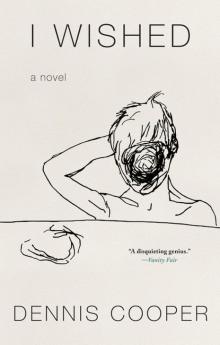 I Wished
I Wished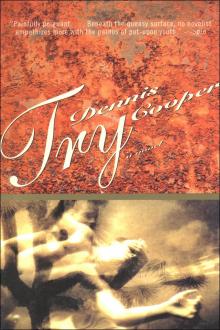 Try
Try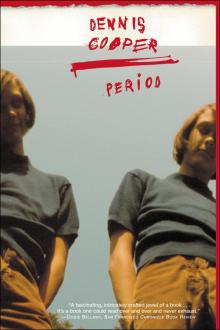 Period
Period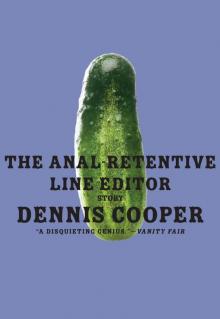 The Anal-Retentive Line Editor
The Anal-Retentive Line Editor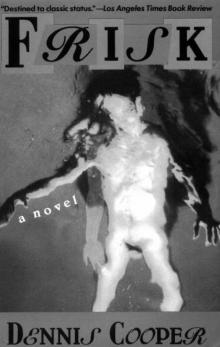 Frisk: A Novel (Cooper, Dennis)
Frisk: A Novel (Cooper, Dennis)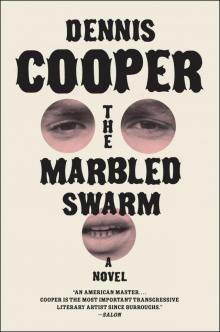 The Marbled Swarm
The Marbled Swarm